
Visits to Gorky and MengeryCHAPTER 9 From time to time I had to go to Gorky to attend to all sorts of things connected with the Shava orphanage and once I was also asked to attend a seminar for kindergarten teachers. During that trip I went to the Gorky opera theatre and heard Glinka's "Ivan Susanin". The following postcards, relatively recent ones, show some of the central spots in town. The first one shows the Minin and Pozharsky Square (named after the two leaders of the 17th century Russian peasants' revolt) with the Gorky Kreml' on the right and the Palace of Labor on the left. The second one is of the Kreml' wall (the word "kreml'' means citadel in Old Russian – Tr.) and the Jubilee Boulevard.
In August of 1943 everyone in the orphanage was very excited: we learned that several children will join me on a visit to Mengery. It transpired that Olya, the sister of one of our girls, Nina Bivko, has been living in Mengery and we were planning to visit her there and then bring her back with us. We took the river boat to Gorky. The trip was a lot of fun. A young solder decided that I was one of the Pioneers as I was wearing my red scarf and he kept asking which of the adults was accompanying our group. He refused to believe me that I was that adult until I had shown him my passport. "You should always look as young as you look now!" – he said. I do not remember how we reached the Mengery orphanage. I do remember that the meeting between the two sisters was very touching. We all felt that we were homesick and wanted to go back to Shava as soon as possible. I learned from my notes of that period that at some later stage I had to go to Moscow. I was asked to meet with A.Kirkhenshtein himself, who was then the Chairman of the Presidium of the Latvian Supreme Soviet, and tell him about our orphanage. During that period I was also requested by B.Berkovich to write an article about Komsomol medals for the Latvian newspaper "Tzinja" and to prepare a program about our orphanage for a radio broadcast directed to Latvia. The radio program was done without my having used the surnames of the children, but later I learned that the parents of quite a few of our children had heard the program and it became for them the first sign of the fact that their children were alive and well. I met Yoka during my visit to Moscow and we both attended a meeting of Estonian and Latvian Komsomol members that took place there. This meeting was attended by Elena Koshevaya, the mother of Oleg Koshevoy, a Komsomol member and a war hero depicted in K.Fadeev's book "The Young Guard". Yoka and I danced a lot during that evening and even planned to go on to a once very famous Moscow restaurant called "Yar". Unfortunately the restaurant was closed and we were very disappointed as it took us a long time to get there and I even took along a very nice pair of shoes with me in order to wear them there for the dancing. My Assignment to the Mengery Orphanage In the beginning of 1944 a sudden change upset this established way of life that was so meaningful to me: a life that enabled me to devote all my talents and abilities to my work. I was informed that I shall have to move to the Mengery orphanage where, it appeared, there had been all sorts of mishaps and disorders. Comrade Kalnberzin' himself, who was then the First Secretary of the Central Committee of the Latvian Communist Party, demanded that "the best Pioneer leader" should be sent to Mengery to put things right. I was chosen for this assignment and the news about it had been for me something like a thunder on a clear day. All sorts of telegrams were sent off to Moscow and it was decided in the end that, first of all, I shall go to Moscow "to clear up some things". Following the news about my coming departure the children in my older group wrote me a little card: "Dear Comrade Lyuba! We are very sorry to have to part from you as we grew to love you during the time that we have been here together. You were always ready to help us with good advice or your warm encouragement. Yet the clothes were not that important. I had to do all I could to change that decision about sending me away from our orphanage. It was not an easy thing to do. I met with a number of officials trying to present my arguments, etc., but I also managed to visit some of the theatres! I went to the Maly Theatre where I saw Ostrovsky's "Happiness Is Good, But Truth Is Better", I saw the "Blue Bird" at the MKHAT and I saw two ballets: the "Wonder Horse" and the "Swan Lake" with Lepeshinskaya at the Bolshoy. During all this time my fate was being decided: should I or should I not be moved to Mengery. The final decision was a compromise: it was decided that I shall go to Mengery for a period of three months – to put things in order and to organize the work correctly. Iren was supposed to remain in Shava and I was planning to come back there at the beginning of summer. It was decided that Iren should remain in Shava because travelling to Mengery, especially in winter, was very difficult and the living conditions there were also much worse than in our orphanage. So, I parted from Moscow and started on my way to Mengery. It was a difficult trip. I travelled from Moscow to Kazan and then to Arsk. From there I still had some 80 kilometers left to go, either on foot or by getting a lift on a horse-drawn sled going in the direction I needed. My belongings were in the rucksack I had been carrying on my back. I still cannot understand where I got the energy and the strength for everything I did in Mengery. Work with the Pioneers and the Komsomol members, seminars for teachers and lectures for the older children, special evenings and special meetings – all these I organized and worked for with all my heart and devotion. In the meantime I received an enormous number of letters from the children in our orphanage: not only from those in "my" group, but also from all the others, even from the little boys. Iren wrote to me too, of course, and every word written by her brought me much joy. Here is one of her letters written on the 6th of March 1944. "Dear Mum! I am well. And I now eat much quicker. Today when they woke us up I got up right away and went to wosh. I had washed myself very well at the 'banya' (communal bath) and I had put away my things to be washed but did not lose anything. Babushka said: "Oh, what a rich girl you are!" I want very much for the three months to pass. Regards from everyone at the orphanage. Iren."
|
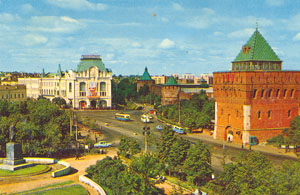
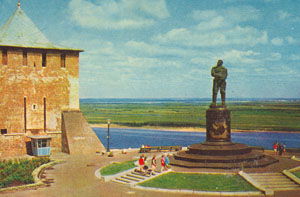
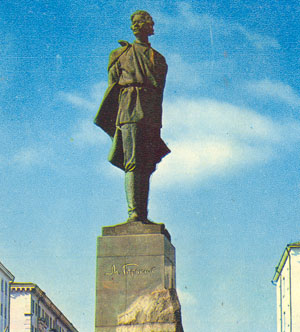
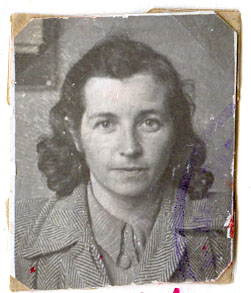 My visit to Moscow this time was a strange one. I arrived in Moscow wearing a thick blue overcoat (all the girls in the orphanage were given coats like that and I received one too), a pair of 'valenki' (felt boots often worn during the cold Russian winter), a warm winter hat with earflaps and… white stockings! We were all wearing such stockings at the orphanage. In Moscow I was "smartened up" a bit: I received a very nice light coat, two dresses, a pair of shoes and real stockings. (All these items came from parcels sent by the American authorities to the Soviet Union.) I remember wearing that coat for years, even after the war. This is a picture where I am still wearing it in 1947.
My visit to Moscow this time was a strange one. I arrived in Moscow wearing a thick blue overcoat (all the girls in the orphanage were given coats like that and I received one too), a pair of 'valenki' (felt boots often worn during the cold Russian winter), a warm winter hat with earflaps and… white stockings! We were all wearing such stockings at the orphanage. In Moscow I was "smartened up" a bit: I received a very nice light coat, two dresses, a pair of shoes and real stockings. (All these items came from parcels sent by the American authorities to the Soviet Union.) I remember wearing that coat for years, even after the war. This is a picture where I am still wearing it in 1947.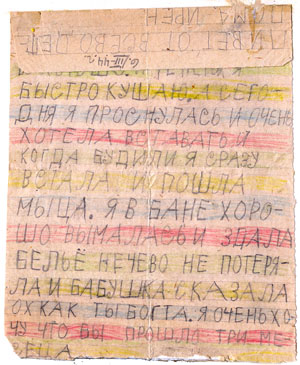 In Mengery I made my acquaintance with Vera Herzbach and her son Ilyusha. He was 10 years old at the time and we talked about books. He was a clever boy. Vera made omelettes for me; that was something very special then.
In Mengery I made my acquaintance with Vera Herzbach and her son Ilyusha. He was 10 years old at the time and we talked about books. He was a clever boy. Vera made omelettes for me; that was something very special then. 